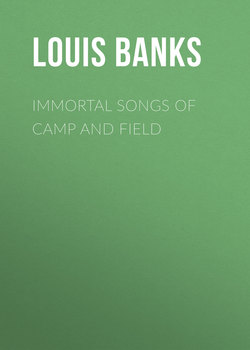Читать книгу Immortal Songs of Camp and Field - Banks Louis Albert - Страница 6
COLUMBIA, THE GEM OF THE OCEAN
ОглавлениеO Columbia! the gem of the ocean,
The home of the brave and the free;
The shrine of each patriot’s devotion,
A world offers homage to thee.
Thy mandates make heroes assemble
When Liberty’s form stands in view,
Thy banners make tyranny tremble
When borne by the red, white, and blue,
When borne by the red, white, and blue,
When borne by the red, white, and blue,
Thy banners make tyranny tremble
When borne by the red, white, and blue.
When war winged its wide desolation,
And threaten’d the land to deform;
The ark then of Freedom’s foundation,
Columbia, rode safe through the storm:
With her garlands of vict’ry around her,
When so proudly she bore her brave crew,
With her flag proudly floating before her,
The boast of the red, white, and blue,
The boast of the red, white, and blue,
The boast of the red, white, and blue,
With her flag proudly floating before her,
The boast of the red, white, and blue.
The winecup, the winecup bring hither,
And fill you it true to the brim;
May the wreaths they have won never wither
Nor the star of their glory grow dim.
May the service united ne’er sever,
But they to their colors prove true,
The Army and Navy forever,
Three cheers for the red, white, and blue,
Three cheers for the red, white, and blue,
Three cheers for the red, white, and blue,
The Army and Navy forever,
Three cheers for the red, white, and blue.
– Thomas à Becket.
This splendid song, as popular, perhaps, as any of America’s patriotic hymns, was written in 1843 by a young actor named Thomas à Becket. He was engaged at that time at the Chestnut Street Theater, in Philadelphia. He was waited upon by a Mr. D. T. Shaw, an acquaintance, who was also an actor, with the request that he would write him a song for his benefit night. Mr. Shaw had been trying to write one for himself, but had made a sad failure of it. He produced some patriotic lines, and asked Mr. À Becket’s opinion on them; he found them ungrammatical and so deficient in measure as to be totally unfit to be set to music. They went to the house of a mutual friend, and there À Becket wrote the two first verses in pencil, and sitting down at a piano in the room of the friend’s house, he composed the melody. On reaching home that evening he added the third verse, wrote the symphonies and arrangements, made a fair copy in ink, and gave it to Mr. Shaw, requesting him not to give or sell a copy to any one.
A few weeks afterward Mr. À Becket left for New Orleans, and a little while later was greatly astonished to see a published copy of his song entitled, “Columbia, the Gem of the Ocean, written, composed, and sung by David T. Shaw, and arranged by T. à Becket, Esq.” On his return to Philadelphia he sought out Mr. Willig, the publisher, who told him he had purchased the song from Mr. Shaw. Mr. À Becket produced the original copy in pencil, and claimed the copyright, which Mr. Willig admitted, making some severe remarks upon Shaw’s conduct in the affair. A week later it appeared under its proper title, “Columbia, the Gem of the Ocean, written and composed by T. à Becket, and sung by D. T. Shaw.” The song has been often printed under the title The Red, White, and Blue, and is very familiarly known as “The Army and Navy Song,” from being peculiarly adapted to reunions of the two wings of the military department of the government.
Mr. E. L. Davenport, an eminent actor, sung the song nightly in London for many weeks, where it became very popular. It was printed there under the title Britannia, the Pride of the Ocean. On this account some people have supposed the English version to be the original, and ours merely an adaptation of it. That part of its title, “The Gem of the Ocean,” belongs to the Emerald Isle, rather than to Columbia, and seems more appropriate to designate an island power like Great Britain than a continental power like the United States. However, it is beginning to look as though we might have islands of our own in abundance.
While red, white, and blue have for a long time been the ranking order of the colors of British national ensigns, with us blue– the blue of the union, the firmament of our constellation of stars – claims the first place on our colors, red the second, and white the third; so that for us the song should read, —
